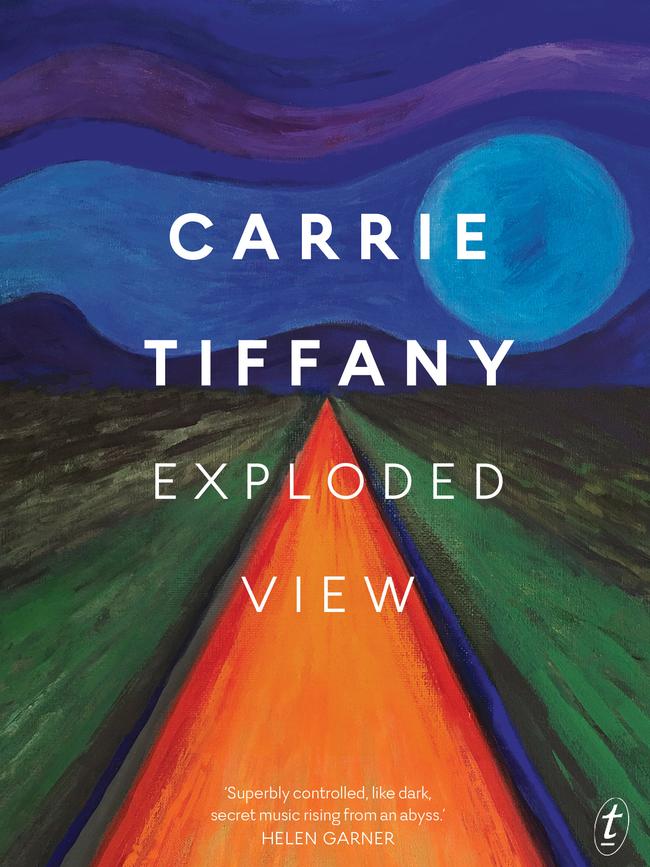Carrie Tiffany’s Exploded View, not a novel about happy families
I like grim novels, so I buckled up and read Carrie Tiffany’s novel Exploded View in one sitting.

“Sometimes when our mother gets home from work, she puts her hand there, near the rabbit’s ears, to see if it is hot, and she’ll tell father man about it because we were using electricity that they had bought together, that wasn’t free, that didn’t belong to us, that didn’t grow on trees.” That moment, 23 pages in, made me suspect this was not a novel about happy families.
There’s nothing wrong with telling your children that electricity costs money — my father told me and my siblings more times than I care to remember — but the kids going to such lengths to avoid being caught unsettled me. Within pages we learn the girl hasn’t spoken for 30 days. When the father man, as she calls him, asks what she wants for Christmas and she doesn’t answer, what he does is dreadful.
Father man also has the only key to the deadlock on the front door, “the outside lock that keeps us out, and the inside lock that keeps us in”. The girl says if there were a fire in the house, “we would be found with our faces pressed to the locked door, as the flames licked at us, as the fire melted our hair. We would die before we went to father man’s coat to touch the keys to the deadlock”. From there, I understood that I was entering one of the grimmest novels I have read, and that’s saying something.

I like grim novels, so I buckled up and read it in one sitting. It is a short, sparely written novel of intense power. It is about one Australian family. No one is named. It’s just girl, brother, mother and father man. The next-door neighbour is the Fat Lady. Tiffany does not spell out what happens, which I like, but I think this is about a violent father who sexually abuses his daughter. The whole story is told by the girl, so her version is all we have to go on. It is a dark book, and that’s worth emphasising. If you don’t like dark books, it may not be for you. I found it brilliantly written and deeply moving.
The title comes from a car manual that the girl knows by heart. An exploded view shows the pieces that make up a part separated, so you can see which bits fit where. The girl helps her father, who runs a dodgy cash-only car repair business from the backyard. She does leave the house at night, sneaking out her bedroom window, and drives her father’s blue Holden or any of the cars in the yard. She speaks of gravel-filled truck arrest beds on the highway. You know this is going to become important.
The girl has another car manual in her head, one in which a man’s hands show the parts. I think this is part of her sexual awakening. “The manual shows that sometimes a delicate touch is needed to manipulate small parts … Engine hands must be strong, but they don’t have to be cruel. Cruelty happens outside the manual.” She then identifies the different kinds of fathers: the angry father, the pitiful father, the forgetful father. She thinks of fathers renting suits and leading their daughters up the aisle. “Even if he never had you, a father will get to give you away.”
The novel is divided into three parts: M Family, A Trip, Home Again. The middle section is the most horrible road trip I have read. Eight days to the house of a family friend, three days there, eight days return. “If you keep on driving in other countries you get somewhere,” the girl thinks. “You get to a new country. Perhaps you get to the sea? If you keep on driving in this country you can lay your whole life down on the road.”
The children carry their belongings in plastic bags. The family eat at greasy spoons and sleep in the car, the girl on the floor. There’s a lot of roadkill. There’s a lot of litter. There’s a lot of shit, human and animal. There’s no love.
When they pass a flower farm, the girl notices a delivery truck with a sign on its side that says Everything’s Coming Up Roses. “When I have money, I will send myself flowers with love words on a white card.” Whether she will one day be able to do that is uncertain. In the final section, she asks: “Is it just dark for us — for our family — and light for everyone else in the world?”
I read Exploded View because it was shortlisted this week for the $60,000 Miles Franklin. It is the third time Tiffany has been shortlisted, following Everyman’s Rules for Scientific Living in 2006 and Mateship With Birds in 2013. The second book was the inaugural winner of the Stella Prize. The other writers in contention are Tony Birch for The White Girl, Peggy Frew for Islands, John Hughes for No One (which I wrote about recently), Philip Salom for The Returns and Tara June Winch for The Yield. Each writer receives $5000 from the Copyright Agency’s Cultural Fund. Congratulations to all. The winner will be announced on July 16.
READ MORE: Selfie-image: What have we done to ourselves? | Michael Connelly’s Fair Warning: forensic take on chilling serial crime




Early in Carrie Tiffany’s novel Exploded View, the narrator, a girl about 13, and her brother, who is one year older, are watching afternoon TV. The fact Hogan’s Heroes is followed by Matlock suggests we are in the 1970s, as does a later reference to Vitas Gerulaitis on the tennis court. As they come to the end of their shows, the children fetch a tub of ice cream from the freezer and put it on the wooden top of the television. The brother moves it around the set top with a golf club so they can remain seated.